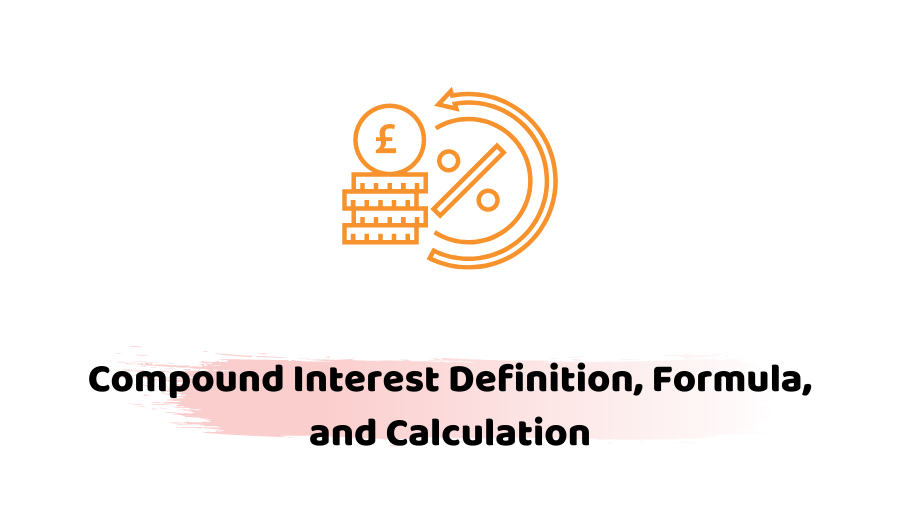Compound interest is a common phenomenon in business if you are an investor, creditor, or debtor. While managing your business, you may want to increase your portfolio over time, for this the ‘eighth wonder of the world’, could help you double your investment within a specified period.
In this blog, we are going to discuss the much-debated and confusing topic of compound interest which plays a crucial role in calculating the exponential growth of your financial assets. so, let’s delve deep into this interesting and financially year viable topic!
We are a Clever, Young, Creative, Forward-Thinking, and Tech-Driven Firm of Chartered Accountants In London, with an Entrepreneurial Mindset. Get in touch to get our services as per your business needs.
What is a Compound Interest Rate?
Compounding interest rate is an exponential growth of your financial assets, paying a certain percentage of interest rate over the principal amount and the interest rate earned on that principal amount for a specific period.
For example, you deposit an amount of £10, 000 into a bank at an interest rate of 5% per annum for five years.
It means the bank will pay you interest rate initially on the principal amount. After that, the bank will pay you an interest rate not only on that original amount but also on the interest rate earned last year.
Now, the term ‘compounding’ makes sense as the amount accumulates over time exponentially, rather than linearly. At this point, it is very important to make a distinction between simple and compounding interest rates. So, let’s move towards this step!
Difference between Simple and Compound Interest Rates
A simple rate of interest is a linear growth of your financial assets. For example, you have lent an amount of £1,000 at a 5% interest rate. When the borrower will pay you back the money, he will just pay you £50 on that principal amount in every period.
In other words, a simple and same interest rate is given only on the principal amount for a specified period.
On the other hand, a compound interest rate pays you interest on the principal amount plus the interest earned in the previous period. For example, you have invested an initial amount of£ 20,000 into a financially stable business that pays you dividends at a rate of 5% annually. However, if you reinvest the dividend into that firm instead of withdrawing that earned dividend, it means you’re compounding your returns and multiplying your investment. if you continue this method for many years, you can accelerate the pace of increasing and accumulating your wealth.
Why Compound Interest Rate is Important?
A compound interest rate is crucial to accumulate and increase your money and wealth over years at a fast track. On the other hand, it helps beat the inflation rates plus increases your financial assets. In other words, compounding interest increases the value and the amount of your money. Similarly, this accumulating interest helps you get rich if you keep patience and get into long-term investments.
Which Factors Affect the Compound Interest Rate?
Let’s now discuss the most important factors. There are three factors affecting the compounding interest rate. If you use these factors and calculate your interest rate based on them, you will definitely get the maximum benefit out of your financial planning. Moreover, you can earn the highest possible profits and returns on your investments ultimately.
1- Principal amount
The principal amount is the initial amount you deposit, lend, or invest. The higher the principal amounts, the higher the percentage earned.
2- Interest rate
The interest rate is the percentage paid on the principal amount in the first compounding period. The higher the percentage, the higher the amount earned.
3- Number of Compounding periods
This is one of the most crucial and central parts of the compound interest rate. As there are more compounding periods mean your money will be compounded more frequently during a certain period. For example, the interest rate can be paid daily, weekly, monthly, quarterly, semi-annually, and annually.
If you’re paid more times in a year, the pace of earning and accumulating wealth increases. If you want to increase your assets quickly and instantly, you need to look at the opportunities where you can earn interest rates multiple times during a year. However, it all depends on your financial goals and financial position.
How to Calculate the Compound Interest Rate?
Calculating compound interest rates doesn’t require special and complex knowledge of accounting or economics. Interestingly, a layman can also calculate this rate easily.
Formula of Compounding interest rate = [P(1 + i)^n] -P
= P[1 + i)^n] – 1
P = Principal amount
i = interest rate
n = number of periods for which interest rate will be paid.
On the other hand, a simple interest rate is calculated as:
Simple interest rate = P * i * N
P = Principal Amount
I = Interest rate
N = Number of periods for which interest rate will be paid.
Conclusion
Lastly, we can conclude that Compounding interest rates is one of the most interesting and exciting tools to develop and grow your financial assets within a short period of time. The power of compounding benefits everyone in the long run. For this, it is very important to make a distinction between a simple and a compounding interest rate. Moreover, the frequency of paying interest rates also makes a huge impact on how much you earn this compound interest.
Speak to one of our qualified accountants? Give us a call on 02034411258 or request a callback. We are available from 9:00 am – 05:30 pm Monday to Friday.
Disclaimer: The information provided in this article about the Compound Interest including text, graphics, and images is general in nature and does not intend to disregard any professional advice.





















































